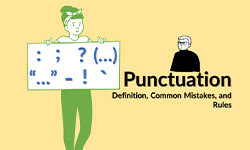
In academic writing, grammatical mistakes are frequently occurring obstacles in the process of writing a research paper or dissertation. In particular, punctuation may create wrong or ambiguous meanings when used incorrectly. This article outlines commonly made punctuation mistakes and navigates you to more detailed articles dealing with each punctuation individually.
Definition: Punctuation
Punctuation defines symbols that are included in writing to provide a clear distinction between sentences, phrases and paragraphs. They also serve to give specific meanings to words or phrases. Common punctuation marks in academic writing are apostrophes, colons, commas, dashes, exclamation points, hyphens, parentheses, question marks, quotation marks, and semicolons.
Incorrect apostrophe punctuation
Apostrophes are often added to pluralize words, which is incorrect. They are used in words to indicate possession with the exception of pronouns. Furthermore, they are used in contractions substituting left-out letters.
Incorrect quotation marks punctuation
Quotation marks are often used incorrectly in academic writing. This list will outline the rules when it is relevant to use quotation marks:
- Citing the exact words of someone else
- Titles of articles, movies, plays or other types of media
- Slang or foreign words
- Expressing irony or sarcasm
Incorrect period or comma punctuation
In American English, periods are placed inside the quotation marks. However, in British and Canadian English, the periods are placed outside the quotation marks.
Commas are frequently overused, and the rules for commas are universally unclear. The following list outlines when it is correct to use commas:
- In dates, addresses, titles and numbers
- Between clauses that are connected with conjunctions
- After introductory clauses
- Sentences that can’t stand alone or don’t have direct reference to the main clause
- Sentence parts with subject-verb agreement
- Nonessential references to a noun
- After directly addressing someone by name
- Lists or series
Incorrect semicolon punctuation
Other common mistakes are made when punctuating semicolons, as it is often misconceived that comma rules apply. However, semicolons are used much less than commas and have their own rules. The following list will account for the most common ways to use semicolons:
- Connecting two complete and related sentences
- Connecting two related sentences, where the second sentence starts with a conjunctive adverb.
- A list within a series
Articles about individual punctuations
Find elaborated articles about each punctuation listed in the table below:
| Punctuation | Example |
| Apostrophes (‘) | Haven’t |
| Colons (:) | Example: |
| Commas (,) | Chris, I would expand. |
| Dashes (–) | A while ago – not important how long ago – he said… |
| Exclamation points (!) | Be careful! |
| Hyphens (-) | Well-known |
| Parentheses () | There is no apostrophe (not our’s, but ours) |
| Question marks (?) | What is your answer to this question? |
| Quotation marks (“…”) | As she previously stated, “The cars where not affected by the impact.” |
| Semicolons (;) | My bike broke down last evening; it’s in reparation right now. |
FAQs
Punctuation represents symbols or a series of marks that make up a clear distinction between sentences, phrases, and paragraphs. They also indicate and alter meanings of words or sentences.
Punctuating mistakes in academic writing are typically made when using apostrophes, colons, commas, dashes, exclamation points, hyphens, parentheses, question marks, quotation marks, and semicolons.
These rules make out the core of punctuating rules:
- Always end a sentence with a period, question mark, exclamation point, or a semicolon.
- In American English, include periods and commas within quotation marks and keep dashes, colons, and semicolons outside the quotation marks.
- Quotation marks and parenthesis always come in a pair
- Nonessential phrases or sentence parts are always separated with commas
- Add commas after introductory sentences

